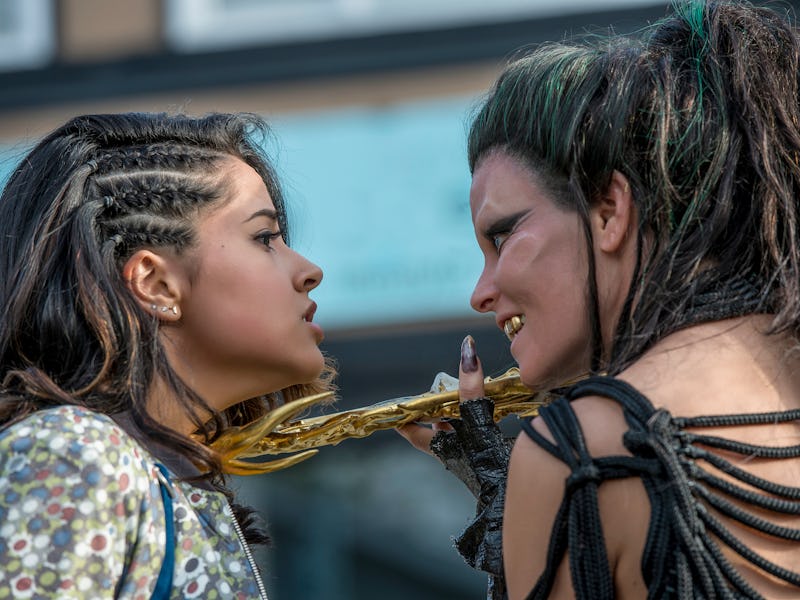Token Queer People Are Not a Marketing Strategy, Hollywood
'Power Rangers' was pushed as debuting the first LGBT superhero, but Trini's actual dialogue is a huge let-down.

Earlier this week, The Hollywood Reporter and Saban told the world that in the new Power Rangers, Trini the Yellow Ranger is definitively queer. People were psyched at the very mention of LGBT representation in a film marketed toward young adults, and Power Rangers was hailed as the first mainstream superhero film to debut a gay hero.
Unfortunately, Trini’s big “coming out” moment in Power Rangers barely even registers as such. As the Rangers sit around a fire, trying to emotionally bond in order to morph into their super-suits, Trini offers up a really vague description of what makes her a tormented teen. “My parents have problems with my…relationships,” she says, in a tone so dark that it sounds like she’s suggesting behavior way more deviant than kissing girls.
“Boyfriend troubles?” asks Zack, the Black Ranger who’s teased a few times as being Trini’s future romantic interest. “Yeah, boyfriend troubles,” Trini spits back at him sarcastically. “…Girlfriend troubles?” Zack asks, quieter this time. We see concern register on the other Rangers’ faces. Trini says, “My parents like labels,” and the conversation moves on.
"One of us is probably gay, maybe — who knows?"
And that’s it, that was the whole of Lionsgate’s big, progressive moment for gay representation in superhero films. It was almost all hype and was quickly dwarfed by her fellow Rangers’ own, more traditional issues. Despite all the headlines that announced that actress Becky G. was “proud” to play a gay superhero, and all the stories that called the film “groundbreaking”, the moment hardly left a dent. Director Dean Israelite called Trini’s identity “pivotal,” but there’s no way he was talking about the actual plot.
Here are the things the other Rangers admit during the “who has it the hardest?” bonding session: Zack’s mother is dying, Billy’s father is dead, and Jason’s disappointed his father by committing a crime and landing himself on house arrest. All three boys get multiple scenes exploring the subjects they bring up at the camp-out, and their characters’ views about their parents change because of the film’s plot.
Trini’s sexuality is never mentioned again, though Rita, the film’s villain, singles her out as an outcast among outcasts. “You’re like me,” she says, suggesting that Trini being queer makes her the most corrupt-able of the five Rangers.
Rita and Trini
Trini’s rejection of “labels” comes on the heels of Disney’s big, failed LeFou storyline in Beauty and the Beast, which was so inconsequential that many fans couldn’t even figure out which scene the company was referring to as an “exclusively gay moment.” LeFou, as many critics have pointed out by now, was originally a gay minstrel show character in Disney’s animated film, styled like a dandy and tripping over himself to get close to Gaston, a buff alpha male. In 2017’s Beauty and the Beast, LeFou dances with a man who enjoys cross-dressing, which isn’t exactly the empowering, definitely gay moment of representation that Disney promised viewers they’d receive.
Is LeFou's dandy wear supposed to be inspiring?
But that’s the core problem here, right? It’s 2017, and we’re still thanking media corporations for simply acknowledging that LGBTQ people exist, which suggests we might never see these characters given robust storylines or depth linked to their sexuality. We’re all still paying attention to blockbuster films, aka corporate products, because the corporations themselves are telling the masses that tiny hints and subtext are supposed to be empowering. It’s a cold way to address demographics of people who truly feel disenfranchised and ignored: “Buy a movie ticket, go see a superhero story, leave feeling like you’ve been ‘represented.’”
Billy, the funny, likable, capable engineer and puzzler, is truly a positive example of representation for kids on the autism spectrum.
Consider the actually groundbreaking way Power Rangers frames the Blue Ranger’s experience with autism: Billy happily tells Jason, the Red Ranger, that he’s on the spectrum in the film’s first couple scenes. He explains, “My brain works differently than yours. I don’t really understand humor a lot of the time, but I’m very good at remembering things. Really good!” Power Rangers’ depiction of a superhero on the autism spectrum is downright charming, but at the same time, the film fails its queer character.
Genre fans looking for LGBTQ representation will recall 2016’s Star Trek: Beyond, which allegedly included a scene filmed in homage to George Takei, the first actor to play Sulu. Sulu, Paramount said, would be portrayed in the Abrams Star Trek universe as a gay man. The shot fans actually got was of a man greeting Sulu at the airport with their daughter. After saying goodbye to Captain Kirk, Sulu and some guy walk away like old buddies; we’re supposed to assume they’re married.
It's difficult to get a non-blurry shot of Sulu's husband in 'Beyond' because the camera doesn't linger on him for very long.
The answer for fans hungry to see stories about queer people in their favorite franchises isn’t necessarily to boycott anything but to take announcements from studios about gay representation with a gigantic grain of salt, and maybe some cynicism. It’s simply not enough for a studio to ask queer people and allies to be placated with narrative table scraps. Asking us to shell out money in support of a franchise while pretending a movie ticket is an investment in progressive politics is downright laughable, and it operates on the pretense that Trini saying she hates “labels” does anyone, anywhere, any good.
Power Rangers, in all its LGBT-positive glory, is in theaters now.